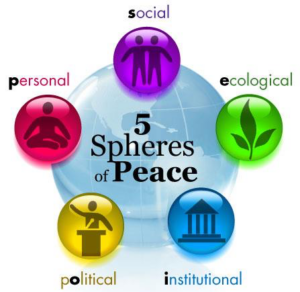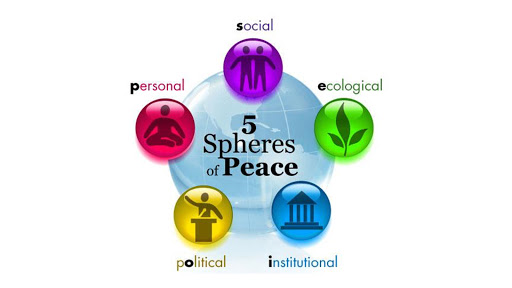[et_pb_section fb_built=”1″ _builder_version=”4.16″ _module_preset=”default” global_colors_info=”{}”][et_pb_row _builder_version=”4.16″ _module_preset=”default” global_colors_info=”{}”][et_pb_column type=”4_4″ _builder_version=”4.16″ _module_preset=”default” global_colors_info=”{}”][et_pb_text _builder_version=”4.16″ _module_preset=”default” global_colors_info=”{}”]
Five Interrelated and Interdependent Spheres of Peace (Defined by National Peace Academy)
Personal Peace refers to “the awareness of one’s authentic being, and living from and relating to others from that awareness”(Snauwaert, 2008). In the personal sphere, peace requires that we actively strive to establish right relationship with our self. Personal peace is pursued through inquiry into how we manage and act upon our internal conflicts, attitudes, actions, and emotions toward living with integrity.
Social Peace refers to the relationships of individuals with other individuals and to their collective coexistence. In the social sphere, peace requires that we actively strive to establish right relationships with others. Social peace is pursued through inquiry into our attitudes, intentions, and actions regarding how we manage our interpersonal conflicts and differences, and how we give to and receive from others the qualities and conditions that comprise human dignity.
Institutional Peace refers to the ways in which organizations and institutions are organized, and the systematic structures and processes through which power is mediated and human affairs are governed. All institutions are essentially political. In the institutional sphere, peace requires that we strive to institutionalize right relationships within and between all forms of organizations, government(s), businesses, systems of organization, and civil society structures to support the development and maintenance of peace systems. Institutional peace is pursued through inquiry into our attitudes, intentions, and actions regarding how we organize and institutionalize the values, principles and norms of justice into systemic structures that moderate human affairs.
Ecological Peace refers to the interdependent and dynamic interrelationships between and among all organisms and their surroundings in a living system. In the ecological sphere, peace requires that we actively strive to establish right relationships with Earth and its ecosystems of which we are a part and on which our survival and quality of life depend. Human systems are not separate from but integral to all living systems, and, as such, human organization affects and is affected by all other ecological systems. Ecosystems are both resilient and fragile, and human life depends upon our respect for, stewardship of, and kinship with the entire planet. Ecological peace is pursued through inquiry into our attitudes, intentions, and actions regarding how we take responsibility to shift our relationship to the natural environment from one based on control over, to one based on interdependence and living with and within.

Political Peace refers to the sphere of human relationship in which diverse individuals and groups come together to discourse, collectively make decisions, and engage in action to create a world together (Arendt, 1958). In the political sphere, peace requires that we actively strive to establish right relationships within and between groups of people, communities and organizations that are supported by just, nonviolent procedures and institutions for making and implementing policy and planning decisions at all levels of social organization. Political peace is pursued through action derived from inquiry into our attitudes, intentions, and actions regarding how we engage in decision-making processes and public discourse.
The need of our planet right now is Global Peace. The fundamental institutions responsible for key decision making, diplomacy and influence are Politics, Religion, and Social Organizations.
Historically, humanity has evolved on Survival Instincts. We have reached a moment where Evolution has to shift from Survival Instincts to Growth Instincts. The values and nature of every industry and institution have changed over time, however, fundamentals of the political system have not evolved, and are carrying the genetic impressions of survival instincts. In order for the current political system to evolve into a representative democratic system, it needs evolution in the fundamental Operational Psychology of the above-mentioned survival instincts.
Political Stability of a nation is directly linked to the Political Consciousness of the nation. Political Consciousness depends upon the activities carried by the political entities of the nation for governance. During every elections, large scale violence is reported worldwide. Though we have moved from the war and conquering psychology to political means of achieving power, we have not been able to get rid of the violence involved in the process. The need of the hour is to engage in Politics like any other profession based upon the values and principals of non-violence, tolerance, and humanity for strengthening global peace.
[/et_pb_text][/et_pb_column][/et_pb_row][/et_pb_section]

Comments are closed